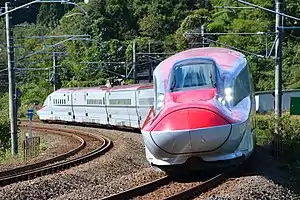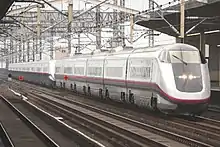| Akita Shinkansen | |||
|---|---|---|---|
 An E6 series trainset on an Akita Shinkansen Komachi service in October 2016. | |||
| Overview | |||
| Native name | 秋田新幹線 | ||
| Owner | |||
| Locale | Iwate and Akita prefectures | ||
| Termini | |||
| Stations | 6 | ||
| Service | |||
| Type | Mini-shinkansen | ||
| Services | Komachi | ||
| Operator(s) | JR East | ||
| Rolling stock | E6 series | ||
| History | |||
| Opened | 22 March 1997 | ||
| Technical | |||
| Line length | 127.3 km (79.1 mi) | ||
| Number of tracks | Double-track and Single-track | ||
| Track gauge | 1,435 mm (4 ft 8+1⁄2 in) standard gauge | ||
| Electrification | 20 kV 50 Hz AC (overhead catenary) | ||
| Operating speed | 130 km/h (80 mph) | ||
| |||
The Akita Shinkansen (秋田新幹線) is a Mini-shinkansen rail line in Japan. Serving the Kantō and Tōhoku Regions of the country, it links Tokyo and Akita in Akita prefecture. From Tokyo to Morioka in Iwate prefecture, it operates on the Tōhoku Shinkansen tracks. From Morioka to Ōmagari, it uses the Tazawako Line tracks. The section from Ōmagari to Akita use the Ōu Main Line tracks.
Operations
Services consist of Komachi trains formed of 7-car E6 series mini-shinkansen sets coupled with E5 series Hayabusa trains for the portion of the journey between Tokyo and Morioka.
The Komachi services run at a maximum speed of 320 km/h (200 mph) on the Tohoku Shinkansen, and between Morioka and Akita, run as 7-car independent trains with a maximum speed of 130 km/h (80 mph).[1] However, 110 km/h (70 mph) is more typical for the line through the hills east of Akita, with trains slowing frequently to 90 km/h (55 mph) for curves such as those south of Ugo. The line from Morioka to Akita is prone to deep snow.
The fastest timetabled journey between Akita and Tokyo currently takes 3 hours and 37 minutes calling at four or five stops in between.
Stations
Between Tokyo and Morioka, the stations are the same as those on the Tohoku Shinkansen. From there on, the stations are as shown below.
| Station | Japanese | Distance (km) | Transfers | Location | ||
|---|---|---|---|---|---|---|
| From Tokyo | From Morioka | |||||
| Morioka | 盛岡 | 535.3 | 0.0 | Tōhoku Main Line Yamada Line Tazawako Line Iwate Galaxy Railway Line |
Morioka | Iwate Prefecture |
| Shizukuishi | 雫石 | 552.9 | 16.0 | Tazawako Line | Shizukuishi | |
| Tazawako | 田沢湖 | 579.4 | 40.1 | Tazawako Line | Senboku | Akita Prefecture |
| Kakunodate | 角館 | 600.0 | 58.8 | Tazawako Line, Akita Nairiku Jūkan Railway Akita Nairiku Line | ||
| Ōmagari | 大曲 | 618.5 | 75.6 | Ōu Main Line, Tazawako Line | Daisen | |
| Akita | 秋田 | 670.2 | 127.3 | Ōu Main Line, Uetsu Main Line, Oga Line | Akita | |
History
- March 22, 1997: The segment from Morioka to Akita began operating with 5-car E3 series trains.
- 1998: Trains were extended to 6 cars.
- September 16, 2001: line celebrates 10 millionth passenger.
- March 11, 2006: line celebrates 20 millionth passenger.
- March 18, 2007: All cars are made no smoking.
- March 11, 2011: All services suspended due to the Tohoku earthquake and tsunami.
- March 18, 2011: Partial service resumes between Morioka and Akita. No through service to Tōhoku Shinkansen.
- April 29, 2011: In conjunction with the reopening of the full length of the Tohoku Shinkansen, through service to Tokyo is restored.
- March 16, 2013: New E6 series trains were introduced on Super Komachi services, operating at 300 km/h (185 mph) on the Tohoku Shinkansen.[2]
- March 15, 2014: All Komachi services operated by E6 series trains, operating at 320 km/h (200 mph) on the Tohoku Shinkansen.[3]
- July 22, 2017: All services between Ōmagari and Akita suspended due to flooding after heavy rain falls.
- July 29, 2017: Service resumes.
- February 13, 2021: Services suspended north of Nasushiobara Station due to the 2021 Fukushima earthquake.[4]
Rolling stock
As of March 2020, the following types are used on Akita Shinkansen services.

- E6 series 7-car sets, since 16 March 2013
Former rolling stock

- E3 series 6-car sets (originally 5-car sets) withdrawn by 15 March 2014
Non-revenue-earning-types

References
- JR Timetable, June 2009 issue
- ↑ 300km/hのトップランナー [300 km/h Top Runners]. Japan Railfan Magazine. Vol. 52, no. 612. Japan: Koyusha Co., Ltd. April 2012. p. 14.
- ↑ 秋田新幹線の新しい列車名は"スーパーこまち"に [New trains on Akita Shinkansen to be named "Super Komachi"]. Japan Railfan Magazine Online (in Japanese). Japan: Koyusha Co., Ltd. 6 November 2012. Retrieved 6 November 2012.
- ↑ Yomiuri Shimbun: "JR東日本の新幹線 13年3月メドに「E6系」導入" (18 June 2009). Retrieved on 19 June 2009. (in Japanese)
- ↑ "Tohoku Shinkansen line breaks from the base of utility poles" (in Japanese). TBS News. 14 February 2021. Archived from the original on 14 February 2021. Retrieved 14 February 2021.




